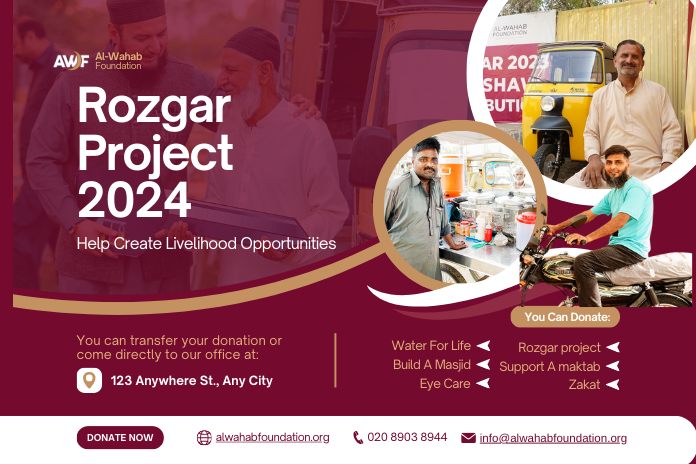Introduction
In today’s world, where poverty and unemployment continue to challenge millions, creating sustainable livelihood opportunities is critical to reducing economic disparities and improving lives. The Al-Wahab Foundation (AWF), a dedicated charity organization, understands this reality. Through its Rozgar Project 2024, AWF is making a significant difference by providing the resources, skills, and opportunities that underprivileged individuals need to build better lives for themselves and their families.
This blog will explore the importance of livelihood programs like Rozgar Project 2024, how AWF is creating opportunities for the needy, and the long-term impact this initiative has on communities.
Understanding the Rozgar Project 2024
The Rozgar Project, initiated by AWF, is a multifaceted initiative aimed at addressing the root causes of poverty by creating employment and self-sustaining business opportunities for individuals and families in need.
The project focuses on empowering people through skill development, providing the necessary tools for income generation, and offering financial assistance for entrepreneurship. The Rozgar Project 2024 is a continuation of AWF’s mission to uplift communities, targeting vulnerable groups such as the unemployed, unskilled laborers, single mothers, and young adults.
Key Objectives of Rozgar Project 2024:
Reducing Unemployment: By providing job opportunities and vocational training.
Economic Empowerment: Encouraging self-sustaining businesses for long-term financial independence.
Skill Development: Equipping people with the skills required to secure decent jobs or start their own businesses.
Supporting Vulnerable Groups: Focusing on marginalized sections of society such as widows, orphans, and the disabled.
Why Livelihood Projects Are Critical
Unemployment and poverty are significant global challenges, especially in developing regions where opportunities for upward mobility are limited. Many individuals, despite their potential, lack access to education, skills, or financial resources to improve their economic standing.
This is where livelihood projects like Rozgar come in. They bridge the gap between need and opportunity by empowering individuals with the tools they need to generate income. When people are empowered with employment or entrepreneurial opportunities, the cycle of poverty can be broken, leading to long-term benefits for individuals, families, and entire communities
Benefits of Livelihood Programs Include:
Sustainable Income: Providing long-term solutions to poverty by helping individuals create a steady source of income.
Community Development: Strengthening local economies through small businesses and skilled labor.
Reduced Dependence on Aid: Empowering people to be self-reliant reduces their dependence on charity or government assistance.
Skill Transfer: Beneficiaries can pass on the knowledge and skills they acquire to others in their community, fostering a culture of empowerment.
How AWF is Implementing Rozgar Project 2024
AWF’s Rozgar Project 2024 has been designed to address various barriers that prevent underprivileged individuals from securing employment or starting a business. From providing financial aid to offering skill-based training, the project ensures that individuals can choose a path toward financial independence based on their interests and abilities.
-
Vocational Training Programs
One of the core components of Rozgar Project 2024 is vocational training. AWF has set up training centers where individuals can acquire hands-on skills in various trades such as carpentry, tailoring, plumbing, and IT services.
For example, many women enrolled in the program have been trained in tailoring and embroidery, enabling them to start their own businesses from home. Similarly, young men are trained in technical trades like electrical work and plumbing, which are in high demand in local markets.
These programs not only give individuals the practical skills needed to find employment but also help them build confidence and independence.
-
Microfinance and Entrepreneurial Support
Starting a business requires more than just a good idea—it needs financial backing. Unfortunately, many underprivileged individuals do not have access to traditional banking or credit facilities. To overcome this, AWF offers microfinance support to Rozgar Project participants, allowing them to start small businesses.
Whether it’s opening a small grocery store, setting up a home-based tailoring service, or launching a mobile phone repair shop, AWF’s microfinance initiative gives individuals the initial capital they need to launch their business. In many cases, this has led to remarkable success stories, where beneficiaries not only improve their own financial standing but also create job opportunities for others in their community.
-
Job Placement Services
For those who prefer employment over entrepreneurship, the Rozgar Project also focuses on job placement. AWF has established partnerships with local businesses and industries that are in need of skilled workers. These businesses are connected with individuals who have completed the vocational training programs.
This creates a win-win situation: businesses benefit from hiring trained professionals, while project participants secure stable employment. AWF continues to provide mentorship and career counseling to ensure that these placements lead to long-term job stability.
Stories of Change: Real-Life Impact of Rozgar Project 2024
The Rozgar Project is not just an idea—it is a movement that is already changing lives. Here are some inspiring stories of individuals who have benefitted from this initiative:
Sana’s Story: A Journey from Despair to Independence
Sana, a young mother of two, had lost her husband in an accident and was struggling to make ends meet. With no job and no skills, she felt hopeless about her future. When she learned about the Rozgar Project’s tailoring program, she decided to take a chance and enrolled. After completing the course, Sana received a sewing machine from AWF, allowing her to start her own home-based business.
Today, she earns enough to support her children and is even planning to expand her business by employing other women in her community. “Rozgar Project gave me the strength to believe in myself again,” says Sana.
Ahmed’s Success as a Skilled Tradesman
Ahmed, a 22-year-old from a rural village, was one of the first participants in AWF’s vocational training for electricians. With limited formal education, Ahmed had struggled to find consistent work, but after completing the Rozgar program, he was hired by a local contractor. His new skills allowed him to work on various construction projects, and he now dreams of starting his own electrical services company.
Ahmed’s story highlights the importance of providing young people with the right training and opportunities to build their future.
The Long-Term Impact of the Rozgar Project 2024
AWF’s Rozgar Project is designed with long-term sustainability in mind. The goal is not only to lift individuals out of poverty but also to create a ripple effect that positively impacts families and communities. When individuals are empowered with skills and employment opportunities, they are more likely to invest in education for their children, improve their living conditions, and contribute to the local economy.
Some of the long-term outcomes expected from the Rozgar Project include:
Community Upliftment: As more individuals gain employment or start businesses, the economic activity in their communities grows, creating more job opportunities and reducing poverty.
Increased Education: Families with stable incomes are better able to send their children to school, which helps break the cycle of poverty for future generations.
Improved Social Status: Financial independence also translates to greater social respect, especially for marginalized groups like women, widows, and disabled individuals.
How You Can Support Rozgar Project 2024
The Rozgar Project’s success relies not only on the efforts of AWF but also on the support of compassionate donors and partners. There are several ways in which you can contribute to this life-changing initiative:
Donate: Your donations help fund vocational training programs, microfinance loans, and job placement services.
Volunteer: If you have skills in training, mentoring, or business development, you can volunteer to help beneficiaries of the Rozgar Project.
Partner with AWF: If you run a business, consider partnering with AWF to provide job opportunities for Rozgar Project participants.
Spread Awareness: Help us raise awareness about Rozgar Project 2024 by sharing our mission with your networks and on social media.
Conclusion
The Rozgar Project 2024 by AWF is not just an employment initiative—it is a beacon of hope for countless individuals who have been left behind by traditional economic systems. By providing the necessary tools, training, and financial support, AWF is creating livelihood opportunities for the needy, transforming lives, and empowering communities.
With the right resources and the continued support of donors and partners, Rozgar Project 2024 has the potential to change the lives of thousands more in the years to come. Together, we can help people move from poverty to prosperity, from dependence to self-sufficiency, and from despair to hope.
If you’re inspired by the work AWF is doing through Rozgar Project 2024, now is the time to get involved. Let’s make a difference, one livelihood at a time.
Also Read: Discovering the Best Manchester Fancy Dress Store



